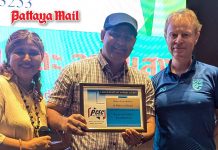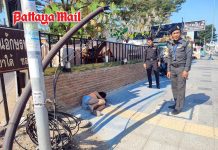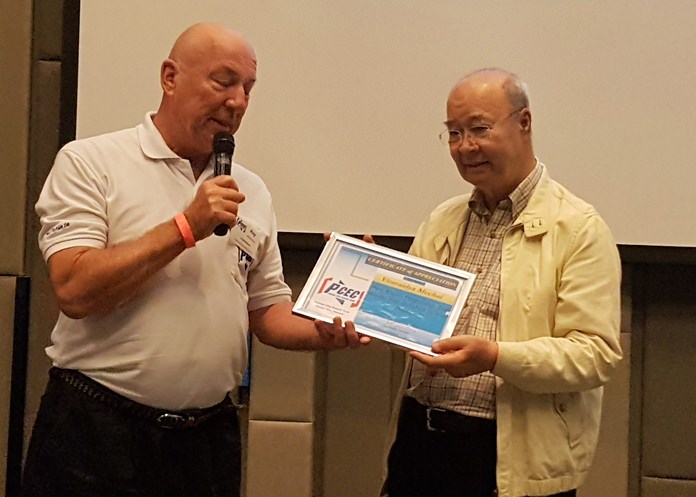
A new dawn in rural Thai education was the message to the Pattaya City Expats Club at their Sunday, January 14 meeting. Mechai Viravaidya, founder and chair of Population and Community Development Association (PCDA), was the speaker. He is a widely acclaimed leader in the fields of public health, education and community development. Since 1974, he has initiated community-based family planning services; innovative poverty reduction and rural education programs. He has also developed large-scale rural environmental programs, as well as groundbreaking HIV/AIDS prevention activities throughout Southeast Asia.
 The PCDA has businesses whose profits help support their activities; these include the Cabbages and Condoms Restaurant chain, the Birds & Bees Resort in Pattaya, and the Business for Rural Education and Development, which sells rural goods and handicrafts.
The PCDA has businesses whose profits help support their activities; these include the Cabbages and Condoms Restaurant chain, the Birds & Bees Resort in Pattaya, and the Business for Rural Education and Development, which sells rural goods and handicrafts.
In 2008, he established the Mechai Bamboo School in Buriram province, Northeast Thailand. The school’s goal is to provide opportunities for rural students from poor backgrounds. He wants to build greater equality and foster change to improve the lack of opportunity that exists in Thai society. He aims to re-engineer rural education and enable the school to act as a life-long learning centre as well as a hub to improve the quality of life of all community members in surrounding areas. Apart from the basic academic subjects, children are taught to be leaders along with the skills associated with good leadership, e.g. true grit, how to share, honesty, openness and to embrace gender equality.
His life-long goal is to empower the poor. He believes that one of the best ways to help is to give people a better opportunity in life through education, e.g. life skills, occupational skills and integrity. By so doing, it will help them get out of poverty with dignity. He believes that there is no end to learning – it is a lifelong endeavour.
Students are eligible to attend by way of a lottery system and there are no admission requirements. This is part of the philosophy that the school aims to embrace. Mechai is convinced that given the educational opportunity, any child can mature into a good citizen regardless of social and economic background.
The school adopts an environmentally conscious, business and philanthropic approach for its students. It is a life-long learning centre not only for young students but for members of the entire community. The Mechai Bamboo School opened its doors to the first Grade 7 class in 2009. Recognising the long-term benefits of this new education system, companies, foundations and industries have since joined the endeavour. However, Mechai is always looking for new support.
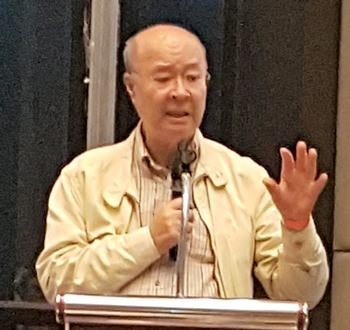
The school is built in a 30 acre mango orchard amidst a ravine and a river. All of the buildings are made of bamboo making it a striking and eco-friendly campus. It has the world’s biggest geodesic bamboo dome, which is used for sports, assemblies and conferences. It also serves as a space for the community to hold other activities.
The school has a climate change centre, a design and innovation centre, and a media centre. Students learn business skills while working with poor families in their community. One of the school’s core objectives is to prepare students to be future social business minded people.
Internet is used for research instead of textbooks. This rich information highway helps enable children to achieve their full potential. Children also complete community work such as recycling to help clean up nearby villages. Students choose which projects and activities they would like to explore and teachers facilitate the learning process so there are no limits to what can be achieved. They are asked to think for themselves, challenge their capabilities and become more active and disciplined learners. All this focuses on learning development rather than achievement. The school takes a holistic approach to learning. The entire community is their classroom.
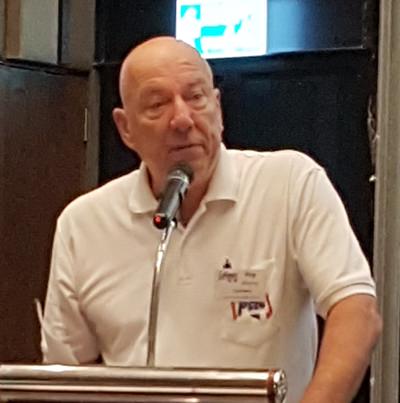
Once the students have discussed and decided what they truly want to learn, the teacher decides on how to incorporate math, science, languages, art and emotion into the lessons. As a key part of getting them ready for the future, the children must identify problems and come up with solutions based on possible resources, including developing social enterprises that have a positive impact within society. They learn how to work as a team in business and in their future endeavours.
Students identify needy children in the nearby villages and provide them with scholarships. The school has established a youth banking system, which the children manage. Children and adults alike benefit from this. Students gain an understanding of the importance of managing money and of small enterprise. Some of the profits from such enterprises are used to fund the scholarships, which in itself promotes a spirit of social cohesion. Students are also involved in the school’s Purchasing Committee. Here children and parents work with teachers to decide on future purchases. The students also actively participate in the teacher selection process.
The school provides a combination of academic and business skills so that in later years, they will have opportunities for careers in their own villages. They learn about furniture design and construction. Then they put their learning into practice, building their own pieces. Agriculture is an important component in the culture and livelihood of rural Thailand. Therefore, students also learn farming techniques and they and their parents get involved in growing crops on school grounds. Mechai has now provided opportunities for blind, disabled, and hard of hearing students to become involved and learn, enhancing their potential for a better life.
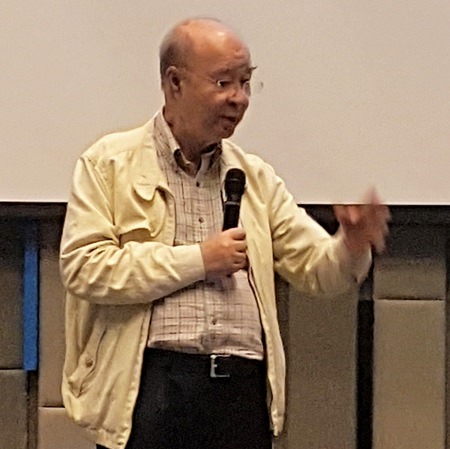
After Mechai answered several questions from the audience, MC Roy Albiston brought everyone up to date on upcoming events. This was followed by the “Open Forum” portion of the meeting, where questions are asked and answered and comments made about expat living in Thailand. For more information on the Club and their activities, visit www.pcec.club.



